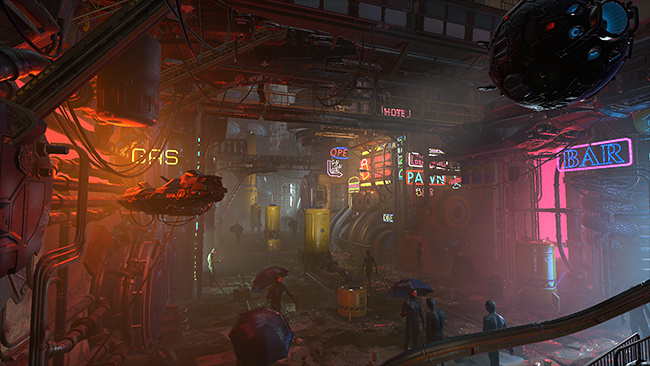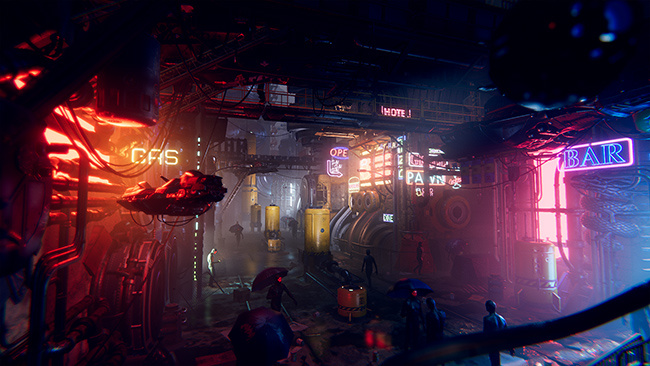Post-processing and full-screen effects
Unity provides a number of post-processing effects and full-screen effects that can greatly improve the appearance of your application with little set-up time. You can use these effects to simulate physical cameraA component which creates an image of a particular viewpoint in your scene. The output is either drawn to the screen or captured as a texture. More info
See in Glossary and film properties, or to create stylised visuals.
This page contains the following information:
The images below demonstrate a SceneA Scene contains the environments and menus of your game. Think of each unique Scene file as a unique level. In each Scene, you place your environments, obstacles, and decorations, essentially designing and building your game in pieces. More info
See in Glossary with and without post-processing.


Render pipeline compatibility
Which post-processing effects are available and how you apply them depend on which render pipelineA series of operations that take the contents of a Scene, and displays them on a screen. Unity lets you choose from pre-built render pipelines, or write your own. More info
See in Glossary you are using. A post-processing solution from one render pipeline is not compatible with other render pipelines.
This table contains information about which of Unity’s post-processing solutions are compatible with each of Unity’s render pipelines.
| Render pipeline | Post-processing support |
|---|---|
| Built-in Render Pipeline | The Built-in Render Pipeline does not include a post-processing solution by default. To use post-processing effects with the Built-in Render Pipeline, download the Post-Processing Version 2 package. For information on using post-processing effects in the Built-in Render Pipeline, see the Post-Processing Version 2 documentation. |
| Universal Render Pipeline (URP) | URP includes its own post-processing solution, which Unity installs when you create a Project using a URP Template. For information on using post-processing effects in URP, see the URP post-processing documentation. |
| High Definition Render Pipeline (HDRP) | HDRP includes its own post-processing solution, which Unity installs when you create a Project using an HDRP Template. For information on using post-processing effects in HDRP, see the HDRP post-processing documentation. |
Note: Post processing stack version 1 is now deprecated and should not be used.
Effect availability and location
This table contains information on which post-processing effects and full-screen effects are available in Unity’s different post-processing solutions, how to find those effects, and what other effects you can use to achieve a similar result.
In previous versions of Unity, you applied all post-processing effects and full-screen effects in the same way; by adding components to a Camera. In more recent versions of Unity, you can apply these effects in different ways.
Note that Unity implements effects differently depending on the package you are using. This means that effects vary in terms of performance, appearance, and configuration between packages.
| Effect Name | Description | Available in URP integrated solution? | Available in HDRP integrated solution? | Available in PPv2 package? |
|---|---|---|---|---|
| Ambient Occlusion | The Ambient Occlusion effect darkens the areas in your scene that are not exposed to ambient lighting. | Yes See Universal Render Pipeline: Ambient Occlusion You can also apply Ambient Occlusion as part of your baked lighting. For more information, see Baked Ambient Occlusion |
Yes Choose from SSAO using a Volume Override, or Ray-Traced Ambient Occlusion You can also apply per-Material Ambient Occlusion You can also apply Ambient Occlusion as part of your baked lighting. For more information, see Baked Ambient Occlusion |
Yes See Post Processing: Ambient Occlusion You can also apply Ambient Occlusion as part of your baked lighting. For more information, see Baked Ambient Occlusion |
| Anti-aliasing | The Anti-aliasing effect softens the appearance of edges in your scene. Depending on your render pipeline, you can use MSAA (hardware anti-aliasing), or FXAA, SMAA, or TAA (anti-aliasing post-processing effects) |
Yes FXAA and SMAA can be enabled in the Camera component You can also configure MSAA (hardware anti-aliasing) in Quality Settings |
Yes FXAA, SMAA, and TAA are implemented in Project Settings > Frame Settings > HDRP Default Settings; see Anti-aliasing in the High Definition Render Pipeline You can also configure MSAA (hardware anti-aliasing) in the HDRP Asset - see Anti-aliasing in the High Definition Render Pipeline. |
Yes For FXAA, SMAA, and TAA, see Post Processing: Anti-aliasing You can also configure MSAA (hardware anti-aliasing) in Quality Settings |
| Auto Exposure | The Auto Exposure effect dynamically adjusts the exposure of an image to match its mid-tone. | No | Yes In High Definition Render Pipeline: Exposure Volume Override, when Mode is set to Automatic |
Yes See Post Processing:Auto Exposure |
| Bloom | The Bloom effect makes bright areas in your image glow.Note that Bloom works differently in each package, and requires different settings; read the documentation for a given package for more information. | Yes See Universal Render Pipeline: Bloom |
Yes See High Definition Render Pipeline: Bloom |
Yes See Post Processing: Bloom |
| Channel Mixer | The Channel mixer lets you adjust the balance of each input color. | Yes See Universal Render Pipeline: Channel Mixer |
Yes See High Definition Render Pipeline: Channel Mixer |
Yes See Channel Mixer in Post Processing: Color Grading |
| Chromatic Aberration | The Chromatic Aberration effect disperses colors along the boundaries between dark and light areas of the image. | Yes See Universal Render Pipeline: Chromatic Aberration |
Yes See High Definition Render Pipeline: Chromatic Aberration |
Yes See Post Processing: Chromatic Aberration |
| Color Adjustments | The Color Adjustments effect lets you change the overall tone, brightness, and contrast of the final rendered image. | Yes See Universal Render Pipeline: Color Adjustments |
Yes See High Definition Render Pipeline: Color Adjustments |
Yes See Tone in Post Processing: Color Grading |
| Color Curves | The Color Curves effect lets you adjust specific ranges in hue, saturation, or luminosity. | Yes See Universal Render Pipeline: Color Curves |
Yes See High Definition Render Pipeline: Color Curves |
Yes See Grading Curves in Post Processing: Color Grading |
| Fog | The Fog effect simulates the look of fog or mist in outdoor environments. | No | Yes See High Definition Render Pipeline: Fog Volume Override (note that this is not implemented as a full-screen effect or post-processing effect) |
Yes See Post Processing: Deferred Fog |
| Depth of Field | The Depth of Field effect blurs the background of your image while the objects in the foreground stay in focus. | Yes See Universal Render Pipeline: Depth of Field |
Yes See High Definition Render Pipeline: Depth of Field |
Yes See Post Processing: Depth of Field |
| Grain | The Grain effect overlays film noise onto your image. | Yes See Universal Render Pipeline: Film Grain |
Yes See High Definition Render Pipeline: Film Grain |
Yes See Post Processing: Grain |
| Lens Distortion | The Lens Distortion effect simulates distortion caused by the shape of a real-world camera lens. | Yes See Universal Render Pipeline: Lens Distortion |
Yes See High Definition Render Pipeline: Lens Distortion |
Yes See Post Processing: Lens Distortion |
| Lift, Gamma, Gain | The Lift, Gamma, Gain effect allows you to perform three-way color grading. | Yes See Universal Render Pipeline: Lift, Gamma, Gain |
Yes See High Definition Render Pipeline: Lift, Gamma, Gain |
Yes See Trackballs in Post Processing: Color Grading |
| Motion Blur | The Motion Blur effect blurs the image in the direction of the camera’s movement | Yes See Universal Render Pipeline: Motion Blur |
Yes See High Definition Render Pipeline: Motion Blur |
Yes See Post Processing: Motion Blur |
| Panini Projection | The Panini Projection effect corrects distortion at the edge of an image caused by a wide field of view. | Yes See Universal Render Pipeline: Panini Projection |
Yes See High Definition Render Pipeline: Panini Projection |
No |
| Screen Space Reflection | The Screen Space Reflection effect creates subtle reflections that simulate wet floor surfaces or puddles. | No | Yes See High Definition Render Pipeline: Screen Space Reflection |
Yes See Post Processing: Screen Space Reflection |
| Shadows Midtones Highlights | The Shadows Midtones Highlights effect separately controls the tint and brightness of the shadows, midtones, and highlights in your image | Yes See Universal Render Pipeline: Shadows, Midtones, Highlights |
Yes See High Definition Render Pipeline: Shadows Midtones Highlights |
No |
| Split Toning | The Split Toning effect maps two different tones in your image to two specific colors. | Yes See Universal Render Pipeline: Split Toning |
Yes See High Definition Render Pipeline: Split Toning |
No |
| Tonemapping | The Tonemapping effect remaps the values of an image to high dynamic range (HDR) colors | Yes See Universal Render Pipeline: Tonemapping |
Yes See High Definition Render Pipeline: Tonemapping |
Yes See Tonemapping in Post Processing: Color Grading |
| Vignette | The Vignette effect darkens the edges of an image | Yes See Universal Render Pipeline: Vignette |
Yes See High Definition Render Pipeline:Vignette |
Yes See Post Processing: Vignette |
| White Balance | The White Balance effect preserves the white areas in your image and balances other tones around the white areas | Yes See Universal Render Pipeline: White Balance |
Yes See High Definition Render Pipeline: White Balance |
Yes See White balance in Post Processing: Color Grading |